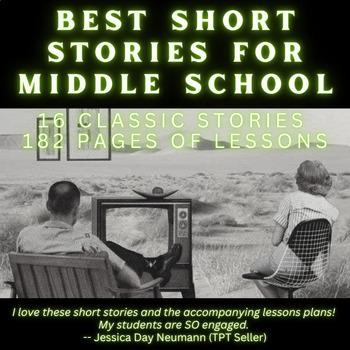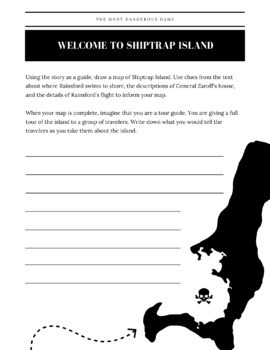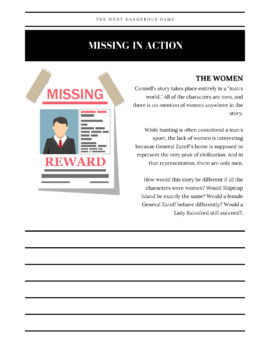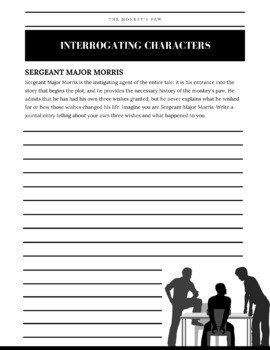Best Short Stories for Middle School: 182 Pages of Highly-Engaging Lesson Plans
- PDF
What educators are saying
Also included in
- This bundle brings together our outstanding lesson plan compilations for both middle school and high school. Every English teacher knows there are stories that work at both levels, and bundling these resources together allows teachers to get access to all 28 stories at a lower price.Lesson plans arePrice $22.99Original Price $27.98Save $4.99
Description
All of the sixteen stories for these lesson plans can be downloaded from our website for free in a reader-friendly PDF that we've created.
Or check out our massive middle/high school bundle of 28 stories which combines our two bestselling resources at 20% off.
Lesson plans are for the following stories:
- The Most Dangerous Game by Richard Connell
- The Monkey's Paw by WW Jacobs
- The Black Cat by Edgar Allan Poe
- The Hitch-Hiker by Lucille Fletcher
- The Lottery by Shirley Jackson
- Lamb to the Slaughter by Roald Dahl
- The Veldt by Ray Bradbury
- The Nine Billion Names of God by Arthur C Clarke
- Third From the Sun by Richard Matheson
- The Pedestrian by Ray Bradbury
- Time Enough at Last by Lynn Venable
- The Cast of Amontillado by Edgar Allan Poe
- Harrison Bergeron by Kurt Vonnegut
- The Landlady by Roald Dahl
- Sorry, Wrong Number by Lucille Fletcher
Our lesson plans are divided into the following sections:
Intro
Each of our lesson plans begins with a short intro page giving a brief review of the story and its publication history: when it was first published and where.
Story in Context
Brief background is provided for certain concepts that students may be unfamiliar with. Enough to encourage class discussion, but not enough to be distracting to the story itself.
In these lessons we explore the history of black cats and big game hunting, contemplate the reasons behind "lucky" rabbit feet, ponder harvest rites, discuss radio dramas are a precursor to podcasts, history of radio dramas, the dangers of nuclear war, the power of a dog's nose, the history of catacombs, and ask if anyone can know the true name of God.
Stories in Conversation
Stories do not exist in a vacuum. Our lesson plans try to connect the dots between the story itself and other stories, movies, and media that came before and after.
In these lessons we draw connections between a wide range of stories and movies from Jorge Luis Borges to Stephen King, from The Twilight Zone to Ian Fleming and even The True Story of the Three Little Pigs. We see how Edgar Allan Poe was inspired by Honore Balzac, how Maupassant influenced Ernest Hemingway, and more.
Interrogating Characters
Interrogating Characters presents students with a way to engage with specific characters in the story. We select characters other than the main character or narrator so that students can ponder other points of view.
In these lessons we interrogate a madman's wife, a sergeant major returning from India, a police detective, a hitchhiker who gets more than she bargained for, a man whose work brings about the end of the world, the Handicapper General of the United States, a murderous landlady, a wealthy man who ends up sealed behind a brick wall, a journalist who predicts the coming nuclear war, a teacher who is ultimately brought back from the dead, and many more.
Missing in Action
Every story has gaps or missing points of view. In Missing in Action, we ask students to consider those neglected viewpoints in order to gain a better understanding of what the author has left out.
In these lessons we ponder why there are no women in a civilized society, examine the thought process of the perfect mechanical home, debate the existence of a ghostly hitchhiker, question a guard who allows a family to escape with a space ship, ponder the wife of a man lost in the rubble of a ruined city, examine a cab driver whose passenger loses a diamond necklace in his cab, and wonder about the future of a baby whose mother murdered its father.
Analyzing Language
Analyzing Language provides 6 questions that look specifically at the language the author has used and asks students to consider those choices to better understand the story.
Activity
Each lesson plan has one Activity. Some are solo projects, others are done with partners or in groups. Activities engage students with the text in ways that are analytical but not based on essay responses.
In these lessons we craft maps of a deadly island in the Caribbean, prepare a legal defense for an insane murderer, modernize a deadly tradition, plan the perfect crime, write our own radio play, determine how to make a classroom equal in every single way, design a family crest, select 20 books to keep for restarting civilization, and write our own radio play.
Launchpad
Launchpad asks students to write their own stories using the story selection as a starting point. Usually this is a continuation of the tale that asks students to use their imaginations.
In these lessons we contemplate the future of two children who sacrificed their parents for technology, pen a tale about the very end of existence, consider the reasons a man seeks a divorce, follow a family arriving on a new planet, write about a dog that goes hunting for the dead, follow a blind man traveling through a burned out city in the aftermath of nuclear war, wonder about a wife seeking revenge on her husband's murderer and write a story from the point of view of a misunderstood feline.






